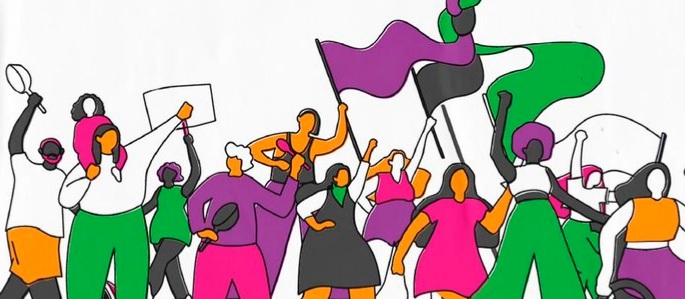From the Coordinadora Feminista Punta Arenas, Elisa Giustinianovich, stated that there is a broad majority that has expressed its opposition to the so-called Agreement for Chile agreed by the traditional parties represented in Congress, which has led to a position of distrust, vigilance and denunciation of the exclusionary and anti-democratic nature of the design of this second constitutional process.
By Leonardo Buitrago
Between the 28th and 29th of January, the V Plurinational Meeting of Women and Dissidents in Struggle took place, with the aim of preparing for the coming 8th March and the mobilisations in 2023 after the constitutional plebiscite.
The event, which took place at the University of Santiago (USACH), brought together more than 40 organisations from Arica to Punta Arenas, with the aim of reorganising and rethinking work strategies. Two months before another 8M and the commemoration of the 50th anniversary of the coup d’état in Chile.
At the meeting, the representatives of the different feminist organisations put forward ideas and strategies for moving forward and not backtracking on the most urgent demands of the collective.
They also agreed that they will remain vigilant regarding the development of the new constituent process.
“We did not see any desire (in the feminists) to dispute the upcoming elections with the first people because it is practically a waste of time. However, this does not mean that we are going to exclude ourselves, this is a decision that is being discussed in all the territories because it is also possible that some alliances can be forged from outside in the event that, through the political parties, members of the feminist movement manage to enter with whom we can have some means of communication,” she explained, quoted by Radio U de Chile.
For her part, the spokesperson for Ni Una Menos, Elena Dettoni, made the same observation that was made to the previous process developed by the Constitutional Convention, referring to reaching a joint position of action to its interior of the feminist movement.
“It all depends on whether we manage to articulate a mobilising force again, as we managed to do during the first trial, but if we run for our own colours, then no. We are open and receptive to articulating a mobilisation force, but we are also open to the idea of mobilising the women’s movement. We are open and receptive to articulate ourselves if there is a debate, we are not subtracting ourselves a priori,” said Dettoni, while insisting on the need to remove it to confront the onslaught of the ultra-right and ultra-conservative anti-rights sectors.
In December, the Mapuche Women’s Network issued a statement expressing its disapproval of the “Agreement for Chile” and calling for a new meeting.
Its representative, who also participated in the meeting, Yanka Millapán, indicated that they will remain mobilised in the streets until they know what the opening towards the first nations will be like, as their priority demands include the recognition of a Plurinational State, the demilitarisation of the Wallmapu and the defence of biodiversity.
“This new agreement is not born of a people’s conscience and we do not feel represented, nor is it known how the participation of the original peoples will be, as there will be no indigenous consultation and there is no mention of their quotas. It is an issue that apparently does not preoccupy the people who drafted it,” he said.






